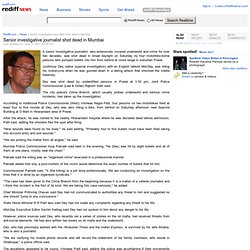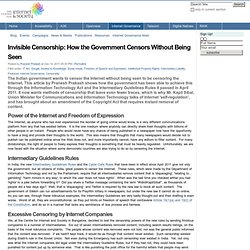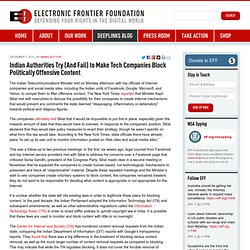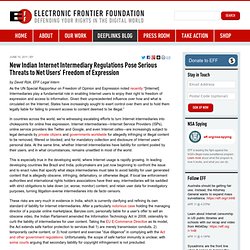

'Mumbai shuts down due to fear, not respect' Mumbai: Senior investigative journalist shot dead. A senior investigative journalist, who extensively covered underworld and crime for over two decades, was shot dead in broad daylight on Saturday by four motorbike-borne persons who pumped bullets into him from behind at close range in suburban Powai.

Jyotirmoy Dey, editor (special investigation) with an English tabloid Mid-Day, was riding his motorcycle when he was gunned down in a daring attack that shocked the media fraternity. Dey was shot dead by unidentified persons in Powai at 3.30 pm, Joint Police Commissioner (Law & Order) Rajnish Seth said. The city police's Crime Branch, which usually probes underworld and serious crime incidents, has taken up the investigation. 2010 Pioneer Award Winner Hari Prasad Defends India's Democracy. It has been some time since EFF blogged about Hari Prasad.

Earlier this year, a team of security researchers led by Prasad, Alex Halderman, and Rop Gonggrijp was able to study an electronic voting machine (EVM) in actual use in India. The study was limited, because the researchers had agreed to return the machine intact, thus preventing them (for example) from getting to the software source code that is baked into the CPU. Still, contrary to claims by the Election Commission of India (ECI) that the machines are tamper proof and infallible, the study showed significant vulnerabilities that would not be difficult to execute. For his troubles, Prasad was arrested and jailed in August, held without bail in Mumbai for a week. Though he is now out on bail and in the United States, he still faces criminal prosecution for alleged theft of the EVM and other charges. Invisible Censorship: How the Government Censors Without Being Seen.
The Indian government wants to censor the Internet without being seen to be censoring the Internet.

This article by Pranesh Prakash shows how the government has been able to achieve this through the Information Technology Act and the Intermediary Guidelines Rules it passed in April 2011. It now wants methods of censorship that leave even fewer traces, which is why Mr. Kapil Sibal, Union Minister for Communications and Information Technology talks of Internet 'self-regulation', and has brought about an amendment of the Copyright Act that requires instant removal of content. India: Kapil Sibal vs. The Netizens On Filtering Social Media.
Earlier this week, the Indian Union Communications and IT Minister Kapil Sibal asked Internet giants such as Facebook, Google and Yahoo to pre-screen derogatory, defamatory and inflammatory content about political leaders and religion. Mr. Sibal suggested that the content uploaded by over 100 million Internet users in India be pre-screened and stopped from going live if found objectionable. And by ‘screening’ the minister meant manual screening and not screening by technology. Indian Authorities Try (And Fail) to Make Tech Companies Block Politically Offensive Content. The Indian Telecommunications Minister met on Monday afternoon with top officials of Internet companies and social media sites, including the Indian units of Facebook, Google, Microsoft, and Yahoo, to compel them to filter offensive content.

The New York Times reported that Minister Kapil Sibal met with executives to discuss the possibility for their companies to create internal mechanisms that would prevent any comments the state deemed “disparaging, inflammatory or defamatory” towards political and religious figures. The companies ultimately told Sibal that it would be impossible to put this in place, especially given the massive amount of data that they would have to oversee. In response to the companies’ position, Sibal declared that they would take policy measures to enact their strategy, though he wasn’t specific on what form this law would take. This was a follow-up to two previous meetings. India cracks down on the Blackberry. High performance access to file storage The use of the humble Blackberry may be outlawed in India if Research in Motion fails to comply with the government’s strict security demands.

India’s Department of Telecommunications is under parliamentary pressure to force Blackberry maker RIM to stop offering services in a highly encrypted format. Security agencies have long expressed concern over Blackberry's encryption, and have demanded RIM provides the data in a readable or intercept-friendly format. New Indian Internet Intermediary Regulations Pose Serious Threats to Net Users’ Freedom of Expression.
By David Rizk, EFF Legal Intern As the UN Special Rapporteur on Freedom of Opinion and Expression noted recently “[Internet] Intermediaries play a fundamental role in enabling Internet users to enjoy their right to freedom of expression and access to information.

Given their unprecedented influence over how and what is circulated on the Internet, States have increasingly sought to exert control over them and to hold them legally liable for failing to prevent access to content deemed to be illegal.” In countries across the world, we're witnessing escalating efforts to turn Internet intermediaries into chokepoints for online free expression.
This is especially true in the developing world, where Internet usage is rapidly growing. These risks are very much in evidence in India, which is currently clarifying and refining its own standard of liability for Internet intermediaries. The rules came into force quietly in April. To make matters worse, the takedown procedure is swift and harsh.